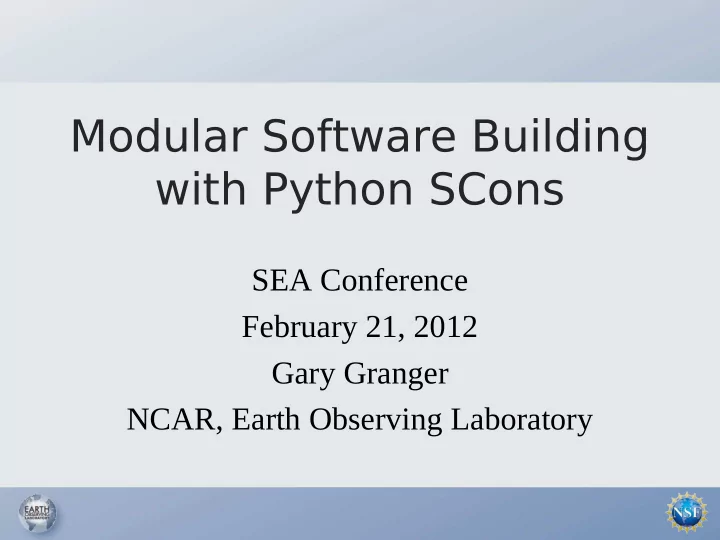

Modular Software Building with Python SCons SEA Conference February 21, 2012 Gary Granger NCAR, Earth Observing Laboratory
Build System Goals • Modular – Change how a module is built without changing the builds which depend on it • Portable – One build system for multiple platforms which runs from IDEs and CI tools. • Extensible – Build more than programs • Configurable – Let developer define and configure build options Feb 21, 2012 SEA Conference 2
SCons Key Points • Definition and procedure in one powerful scripting language: python • Build configuration divided into modular tools , including C, C++, Java, FORTRAN... • One complete dependency tree assembled from build scripts in sub-trees • Cross-platform: tool scripts can be portable across OS's because python is portable Feb 21, 2012 SEA Conference 3
SConscript Example env = Environment(tools = ['default', 'log4cpp']) sources = Split("""Logging.cc ...""") objects = env.Object(sources) lib = env.Library('logx', objects) env.Default(lib) Feb 21, 2012 SEA Conference 4
SConscript Basics Environment: Construction variables, methods, context Builders: Run commands to generate TARGETS from SOURCES Tools: Extend the Environment with new builders and modify construction variables Virtual Filesystem: All nodes have a path even before they exist Feb 21, 2012 SEA Conference 5
SCons Build Phases SCons does not execute the SConscript to build the targets: 1.Read all of the SConscript files and execute them to build the dependency tree and configure the builders. 2.Run the build engine to analyze dependencies and update the default or explicit targets. Feb 21, 2012 SEA Conference 6
SCons Distinctions • Strict Environment • Careful and thorough dependencies – scanners for implicit dependencies – implicit executables – checksums and not just timestamps • Developer-defined build Variables • Autoconf-like compiler and linker checks • Parser for pkg-config and similar scripts • Parallel builds • Source code control interfaces Feb 21, 2012 SEA Conference 7
EOL SCons • eol_scons package loaded automatically by site_scons in top level directory • Custom tools • Module tools within the source tree • Wrapper Environment methods • Build Variables • Global Target References • Optimizations Feb 21, 2012 SEA Conference 8
boost_date_time.py def generate(env): env.Append(LIBS=['boost_date_time',]) libpath = os.path.abspath(os.path.join( env['OPT_PREFIX'],'lib')) env.AppendUnique(LIBPATH=[libpath]) Feb 21, 2012 SEA Conference 9
tool_logx.py def logx(env): lib = env.GetGlobalTarget('liblogx') env.Append(LIBS=[lib,]) env.AppendUnique(CPPPATH = Dir('.').abspath) env.AppendDoxref(doxref[0]) env.Require(['log4cpp']) Export('logx') Feb 21, 2012 SEA Conference 10
Source Tool Example aeros/ SConstruct: env = Environment(tools = ['default']) SConscript('datastore/SConscript') site_scons [svn:external] site_scons/site_tools/netcdf.py logx [svn:external] logx/tool_logx.py: def logx(env): ..... datastore/SConscript: env = Environment(tools = ['logx']) Feb 21, 2012 SEA Conference 11
Test Wrapper Method def Test (self, sources, actions): xtest = self.Command("xtest", sources, actions) self.Precious(xtest) self.AlwaysBuild(xtest) DefaultEnvironment().Alias('test', xtest) return xtest Feb 21, 2012 SEA Conference 12
Optimization: rerun.py env = Environment(tools = ['default', 'rerun']) if env.Rerun(): Return() > scons rerun=1 Feb 21, 2012 SEA Conference 13
Build Variables Config file: QWTDIR="/opt/local/qwt-6.0.1-svn" NIDAS_PATH="/opt/local/nidas" OPT_PREFIX="/opt/local/aeros-qt4" COIN_DIR="/opt/local/Coin-3.1.3" buildmode="debug" Command line: scons buildmode=debug Feb 21, 2012 SEA Conference 14
Further Developments • SCons interactive mode • More cross-platform work to do, especially cross-platform tests • Consolidate test harness scripting, such as running valgrind and analyzing output • “Next-level integration”: multiple EOL projects all built together • Using the build engine for data processing Feb 21, 2012 SEA Conference 15
SCons and Best Practices • Build the entire source tree and unit tests in one command, with a single build system • Careful about repeatable builds • Reusable build configuration scripts for reusable software libraries • Incorporate standard build products like version headers and documentation • Software distributions • Consistent application of compiler flags Feb 21, 2012 SEA Conference 16
SCons Drawbacks • Performance and scalability • Internal Python can be complex – Hard to track down how build commands are generated – Some mysterious bugs – Confusion over differences with Make • More platform-specific coding than we might like • Learning curve in how to extend or where to insert hooks, but no more than other systems • Non-mainstream build system hinders code sharing Feb 21, 2012 SEA Conference 17
Conclusion SCons is a welcome evolution towards a modular build system, in regular use in several EOL software projects, and I see no reason to turn back. SCons: www.scons.org Email: granger@ucar.edu NCAR is supported by the National Science Foundation. Feb 21, 2012 SEA Conference 18
Recommend
More recommend